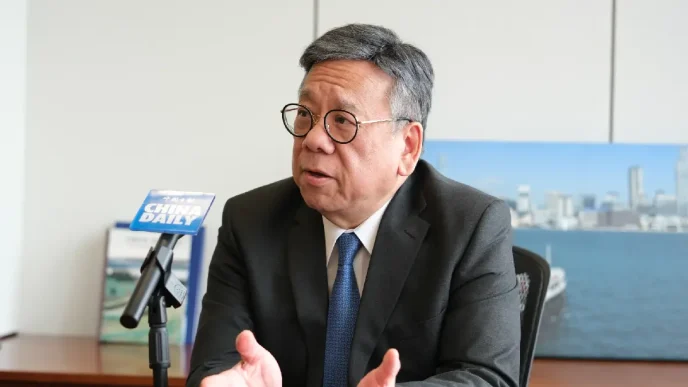Thai authorities have detained 13 foreign nationals, primarily Australians and British, accused of orchestrating an online investment scam that defrauded Australians of at least almost 40 million Thai Baht (approximately USD1.2 million). The arrests, announced yesterday, followed a joint operation between Thailand’s Central Investigation Bureau and the Australian Federal Police (AFP), targeting a group allegedly operating from a rented house in Samut Prakan, near Bangkok.
The raid, conducted on Monday, uncovered an office-like setup with partitioned desks, scam scripts, whiteboards tracking progress, and clocks displaying Australian time zones, according to Thai police. Authorities confiscated phones, computers, and other electronic devices allegedly used in the fraud. The group is accused of luring victims, primarily in Australia, through online advertisements and phone calls promising high returns on long-term bond investments.
Joint Investigation and Arrests
Chief of Thailand’s Central Investigation Bureau, Jirabhob Bhuridej, revealed at a Bangkok press conference that the AFP alerted Thai authorities in 2024 about the scam, led by an Australian and a British national. A months-long investigation followed, requiring extra-jurisdictional and cross-border police agency coordination between AFP and Thai police who monitored the suspects’ movements, noting their activities aligned with Australian working hours. The operation culminated in the raid on the Samut Prakan house, where the 13 suspects were apprehended.
The arrested individuals include six British, five Australian, one Canadian, and one South African nationals. Thai officials stated that the suspects denied the allegations, claiming they believed they were working for a legitimate investment firm. However, police assert the group knowingly engaged in fraudulent activities, targeting English-speaking victims, predominantly in Australia.
Scale of the Scam, Evidence and Operations
AFP senior officer Kristie-Lee Cressy, speaking at the press conference, estimated that at least 14,000 Australians were defrauded by the group, which amassed AUD1.9 million in a short period. “This money was stolen from hard-working Australians, not invested as promised,” Cressy said, emphasizing the operation’s impact. She described the shutdown of the scam center as a “significant win” for both Thai and Australian communities.
Thai authorities noted that the group’s leaders, the Australian and British nationals, are believed to have a history of running similar scams in multiple countries, including Indonesia, where they evaded arrest before relocating to Thailand. The joint Thai-AFP investigation aimed to dismantle the operation and prevent further victimization.
Footage released by Thai police showed the suspects in the raided house, which had been converted into a call center-style office. Desks were equipped with scripts outlining how to pitch fraudulent investments, while whiteboards displayed progress metrics. Clocks on the walls, set to Australian time zones, underscored the group’s focus on targeting victims in Australia. The confiscated devices are undergoing forensic analysis to uncover additional evidence, Thai police said.
The scam allegedly relied on a combination of online ads and cold calls, promising unrealistic returns on long-term bonds. Victims, lured by these promises, transferred funds to accounts controlled by the group, which authorities say were not invested but siphoned off for personal gain. The exact number of victims outside Australia remains unclear, though Jirabhob suggested the scam may have targeted other English-speaking countries.
Context of Investment Scams
Investment fraud has surged globally, with scammers exploiting digital platforms to reach wide audiences. Australia, in particular, has seen a rise in such crimes, with the Australian Competition and Consumer Commission (ACCC) reporting AUD382 million in losses to investment scams in 2024 alone. The Thai operation highlights the international nature of these schemes, often based in countries with lower enforcement risks to target wealthier nations.
The AFP has intensified efforts to combat transnational fraud, collaborating with foreign law enforcement agencies like Thailand’s Central Investigation Bureau. This case marks one of several recent successes, including the disruption of a similar scam network in the Philippines in 2023, which defrauded Australians of AUD12 million.
The 13 suspects face charges in Thailand related to fraud and operating an illegal business, with potential extradition to Australia for some, depending on the evidence and bilateral agreements. Thai law allows for up to seven years’ imprisonment for fraud, though penalties may vary based on the case’s specifics. The suspects’ claim of working for a legitimate company will likely be scrutinized as part of the investigation.
Australia and Thailand have a history of cooperation on transnational crime, formalized through agreements like the 2006 Treaty on Mutual Assistance in Criminal Matters. This framework facilitated the joint operation and may streamline further legal proceedings. The AFP’s presence at the press conference signals continued collaboration to address cross-border scams.
Community Impact and Next Steps
The scam’s AUD1.9 million haul represents significant financial harm to Australian victims, many of whom may struggle to recover their losses. The ACCC notes that only a small fraction of scam-related funds are typically recovered, underscoring the importance of prevention and international enforcement. Cressy urged Australians to verify investment opportunities through licensed financial advisors and report suspicious activity to authorities.
Thai police are continuing their investigation, analyzing seized devices for additional victim data and financial trails. The AFP is working to identify and contact affected Australians, offering support through its cybercrime reporting portal. Both agencies emphasized the need for public awareness to curb the growing threat of investment scams.
This operation underscores the challenges of combating transnational fraud in an increasingly connected world. As scammers exploit jurisdictional gaps, international cooperation remains critical to protecting vulnerable communities and holding perpetrators accountable.
















